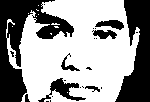N.B. - When the Collegian editors requested me to write a few days before its alumni homecoming, I only gave them a handwritten essay since I had to go to an out-of-town speaking engagement. The rushed encoding may explain the numerous typographical errors of the printed version which appeared on page 15 of the souvenir program of the Philippine Collegian Grand Alumni Homecoming at the Bahay ng Alumni, University of the Philippines in Diliman, Q.C. on 18 May 2001. Here's the full text, sans the errors.
The Collegian in the Context of Uncertainty
By DANILO ARAO
News Editor, Philippine Collegian 1990-1991
From 1988 to 1991, we worked in an atmosphere of political uncertainty. We saw a need then to produce writings that would challenge the mainstream thinking of the times.
Under the Aquino administration, there was an illusion of certainty especially when agrarian reform was dubbed as the regime's centerpiece program.
There was not much news coverage about human rights violations arising from the administration's total war policy (i.e., the implementation of Low Intensity Conflict), in particular the formation of vigilante groups in the countryside.
Coup attempts then were a reflection of political instability as military adventurists tried to seize political power.
The late 1980s may also be considered as the peak of the debate on the US bases. The anti-bases movement then was instrumental to the historic voting against the bases in 1991.
Widespread poverty and social injustice also provided objective conditions for the protracted war in the countryside. In the process, attempts to make peace with the rebels failed as the roots of the armed conflict were not resolved.
UP students also had to deal with problems in their own backyard. It was during the late 1980s and early 1990s that the STFAP was implemented despite the students' widespread opposition to it.
This was also the time of heated debates on the revision of the 1908 UP Charter which recognizes the political authority of the United States.
Some University officials also had their share of controversy like anomalous contracts and technical malversation.
Given this sociopolitical backdrop, we constantly argued about treatment and prominence of pressing local and national concerns. We were all driven by a common resolve to publish only issues that matter to UP students and to the people.
It was in this context that we found fulfillment in the technical difficulty of putting an issue to bed. During the late 1980s, writers used typewriters while editors used cutters, tapes and pencils to edit (or sometimes mangle) articles. Issues then were laid out using dummy sheets, and a professional art director was tapped to take care of the camera-ready pages.
Towards the beginning of the 1990s, Kule was able to buy a nifty gadget for word processing. Just imagine how much we were in awe at the sight of an XT computer! It became a struggle for most of us to learn the rudiments of DOS, Wordstar and Symphony.
But just like the initial difficulty of accepting one's role in the struggle upon realizing the harsh social realities, we managed to adjust and maximize the new technologies towards making production more efficient.
The use of DTP software (Pagemaker) later on proved to be an advantage in expediting the layout process, giving more time for writers and editors to polish the manuscripts' content. Of course, the initial resistance was there, an attitude no different from changing one's mindset vis-a-vis the problems besetting Philippine society.
As we remember what we did (particularly the issues we wrote about) in the past, we cannot help but compare how things are done at present.
This reunion is not the occasion to talk about the validity of one's analysis and the issues that must be written about. Neither is this the moment to quarrel about efficiency and responsiveness to the times.
It is hoped, however, that we all take time to look at where the Collegian stands now and define the social context in which it should operate.
Danilo Arao is currently the research head of IBON Foundation and is a senior lecturer at the Journalism Department, UP College of Mass Communication.

